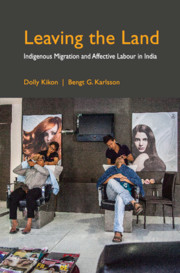2 - Light Skin and Soft Skills
Published online by Cambridge University Press: 04 May 2019
Summary
Life is not about finding yourself. Life is about creating yourself.
(Message on white board at The People Channel, 2015)
The People Channel (TPC) is a placement centre that offers grooming classes. Most of the students come from rural Nagaland. Located in Dimapur, the biggest commercial hub of Nagaland in Northeast India, TPC has proven highly successful in providing placements for its trainees in the high-end hospitality sector, for example, in five-star hotels across cities like Mumbai, Delhi, and Pune. The term ‘five-star’ is an international hotel rating based on luxurious service and facilities offered to customers. This ranking in the hospitality industry is premised on a wholesome experience of service and care. Each five-star luxury hotel explicitly spells out the high-quality facilities it offers, such as spas, world cuisine restaurants, banquet halls, swimming pools, and the different categories of rooms and suites. For example, the Mumbai JW Marriot, a five-star hotel in India that employs students from TPC Dimapur, describes the quality of the bed and its fabric in microscopic details. The official website states: ‘Plush beds include the Marriott Revive Bedding Package with custom duvets and cotton-rich linens.’ But more than the material comforts, high-end hospitality is about personalized services. The more exclusive the hotel, the more personalized the care will be, even to the extent of the staff being able to anticipate and satisfy demands that have not been explicitly articulated by the guests, as Rachel Sherman (2007) convincingly elaborates in her study of the workers that care for and cater to the rich in luxury hotels in the USA.
It is the making of such labourers, turning rural youths into exclusive service personnel, that interests us here. While the hospitality sector to a large extent is built on universal formats, we still have to consider the specific backgrounds, experiences, and aspirations of those who make up its workforce. Important in this case is the recent history of prolonged civil war and massive human rights violations as well as popular struggles for rights to ancestral territories, indigenous livelihoods, and cultures in Nagaland. As outlined earlier, the young indigenous migrants are vested in this history, concerned with the welfare and political mobilization of their respective communities, yet, obviously, still seeking a life outside the geographical confines of imagined ethnic homelands.
- Type
- Chapter
- Information
- Leaving the LandIndigenous Migration and Affective Labour in India, pp. 42 - 59Publisher: Cambridge University PressPrint publication year: 2019



